一级阅读等级考核试题
公共英语一级阅读理解模拟试题(12)
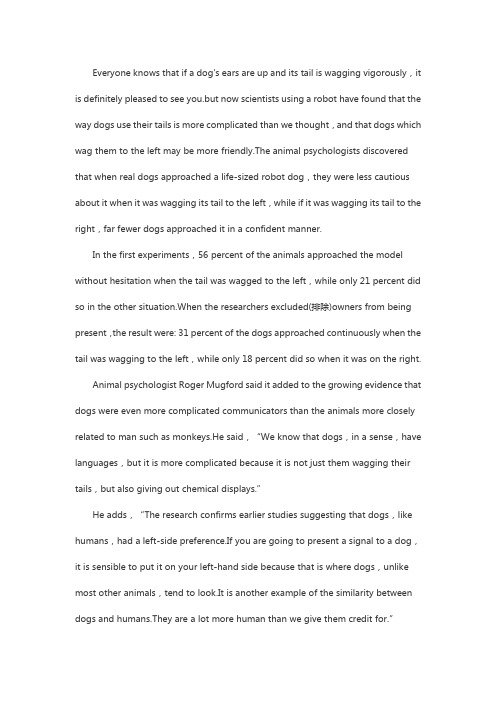
Everyone knows that if a dog's ears are up and its tail is wagging vigorously,it is definitely pleased to see you.but now scientists using a robot have found that the way dogs use their tails is more complicated than we thought,and that dogs which wag them to the left may be more friendly.The animal psychologists discovered that when real dogs approached a life-sized robot dog,they were less cautious about it when it was wagging its tail to the left,while if it was wagging its tail to the right,far fewer dogs approached it in a confident manner.In the first experiments,56 percent of the animals approached the model without hesitation when the tail was wagged to the left,while only 21 percent did so in the other situation.When the researchers excluded(排除)owners from being present,the result were: 31 percent of the dogs approached continuously when the tail was wagging to the left,while only 18 percent did so when it was on the right.Animal psychologist Roger Mugford said it added to the growing evidence that dogs were even more complicated communicators than the animals more closely related to man such as monkeys.He said,“We know that dogs,in a sense,have languages,but it is more complicated because it is not just them wagging their tails,but also giving out chemical displays.”He adds,“The research confirms earlier studies suggesting that dogs,like humans,had a left-side preference.If you are going to present a signal to a dog,it is sensible to put it on your left-hand side because that is where dogs,unlike most other animals,tend to look.It is another example of the similarity between dogs and humans.They are a lot more human than we give them credit for.”【语篇解读】科学实验表明:狗摇尾巴传达了更多的我们以前不知道的信息,并且狗和人类还有许多我们以前不知道的相似性。
2004-2013一级建造师《建设工程经济》真题(阅读版)-林锋整理
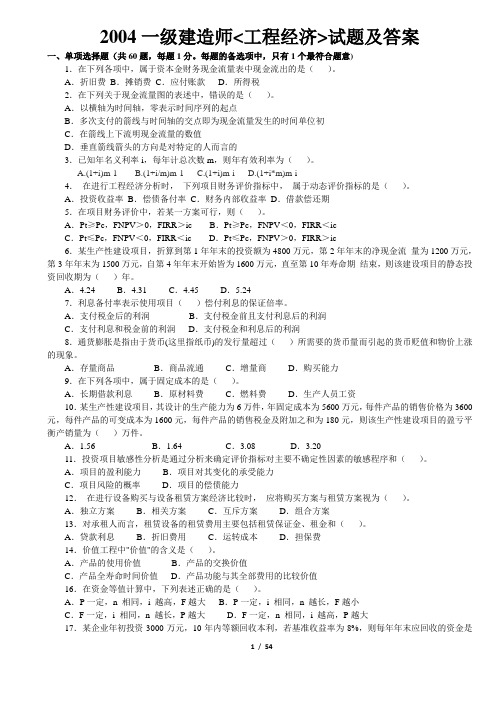
2004一级建造师<工程经济>试题及答案一、单项选择题(共60题,每题1分。
每题的备选项中,只有1个最符合题意)1.在下列各项中,属于资本金财务现金流量表中现金流出的是()。
A.折旧费B.摊销费C.应付账款D.所得税2.在下列关于现金流量图的表述中,错误的是()。
A.以横轴为时间轴,零表示时间序列的起点B.多次支付的箭线与时间轴的交点即为现金流量发生的时间单位初C.在箭线上下流明现金流量的数值D.垂直箭线箭头的方向是对特定的人而言的3.已知年名义利率i,每年计总次数m,则年有效利率为()。
A.(1+i)m-1B.(1+i/m)m-1C.(1+i)m-iD.(1+i*m)m-i4.在进行工程经济分析时,下列项目财务评价指标中,属于动态评价指标的是()。
A.投资收益率B.偿债备付率C.财务内部收益率D.借款偿还期5.在项目财务评价中,若某一方案可行,则()。
A.Pt≥Pc,FNPV>0,FIRR>ic B.Pt≥Pc,FNPV<0,FIRR<icC.Pt≤Pc,FNPV<0,FIRR<ic D.Pt≤Pc,FNPV>0,FIRR>ic6.某生产性建设项目,折算到第1年年末的投资额为4800万元,第2年年末的净现金流量为1200万元,第3年年末为1500万元,自第4年年末开始皆为1600万元,直至第10年寿命期结束,则该建设项目的静态投资回收期为()年。
A.4.24 B.4.31 C.4.45 D.5.247.利息备付率表示使用项目()偿付利息的保证倍率。
A.支付税金后的利润B.支付税金前且支付利息后的利润C.支付利息和税金前的利润D.支付税金和利息后的利润8.通货膨胀是指由于货币(这里指纸币)的发行量超过()所需要的货币量而引起的货币贬值和物价上涨的现象。
A.存量商品B.商品流通C.增量商D.购买能力9.在下列各项中,属于固定成本的是()。
A.长期借款利息B.原材料费C.燃料费D.生产人员工资10.某生产性建设项目,其设计的生产能力为6万件,年固定成本为5600万元,每件产品的销售价格为3600元,每件产品的可变成本为1600元,每件产品的销售税金及附加之和为180元,则该生产性建设项目的盈亏平衡产销量为()万件。
全国英语等级考试一级阅读完整真题及答案
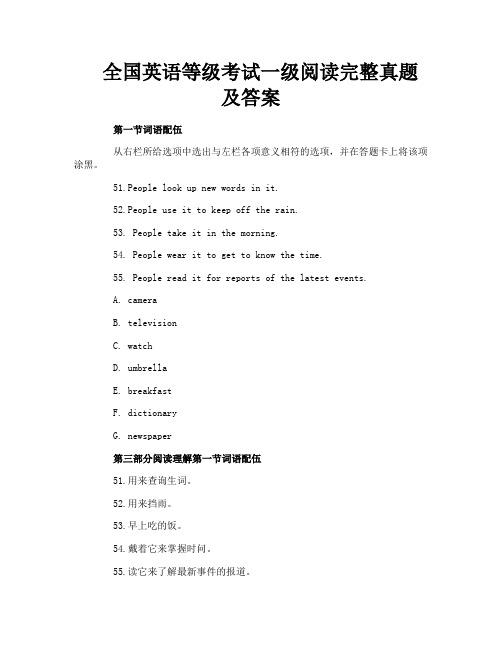
全国英语等级考试一级阅读完整真题及答案第一节词语配伍从右栏所给选项中选出与左栏各项意义相符的选项,并在答题卡上将该项涂黑。
51.People look up new words in it.52.People use it to keep off the rain.53. People take it in the morning.54. People wear it to get to know the time.55. People read it for reports of the latest events.A. cameraB. televisionC. watchD. umbrellaE. breakfastF. dictionaryG. newspaper第三部分阅读理解第一节词语配伍51.用来查询生词。
52.用来挡雨。
53.早上吃的饭。
54.戴着它来掌握时问。
55.读它来了解最新事件的报道。
A.照相机B.电视机C.手表D.雨伞E.早餐F.字典G.报纸51.F52.D53.E54.C55.G第二节短文理解1阅读下面短文,从A.(Right)、B.(Wrong)、C.(Doesn’t say)三个判断中选择一个正确选项,并在答题卡上将该项涂黑。
Farmers do not like crows (乌鸦) because these birds eat newly-planted seeds (种子). They are afraid that they will not have anything left in autumn if the birds eat up all the seeds.It is hard for farmers to get close enough to kill crows. Crows have very good eyes and good hearing. They are also very careful. While some are eating the newly-planted seeds, others sit on the tallest trees around the fields. "Caw-caw-caw," cries the first crow to see farmers coming. All the other "lookout" crows join in the crying and then, in no time at all, there is not a crow to be seen. Farmers have found several ways to kill crows. But it is good that there are still crows about. These birds are our friends. They pay for the seeds they eat by killing pests(害虫). One pest, for example, can eat up several plants in a few hours. With thousands of them at work in one night, we might find ourselves without food to eat. This is why we should not try to kill off the crow.56. According to the writer, crows only bring troubles to farmers.A. RightB. WrongC. Doesn't say57. It is not easy for farmers to kill crows.A. RightB. WrongC. Doesn't say58. Farmers can get paid by killing pests.A. RightB. WrongC. Doesn't say59. Up to now, no ways have been found to kill crows.A. RightB. WrongC. Doesn't say60. Crows eat seeds and pests at night.A. RightB. WrongC. Doesn't say第二节短文理解l农民不喜欢乌鸦,因为这些鸟会吃掉新种下的种子。
公共英语一级阅读理解试题(6)
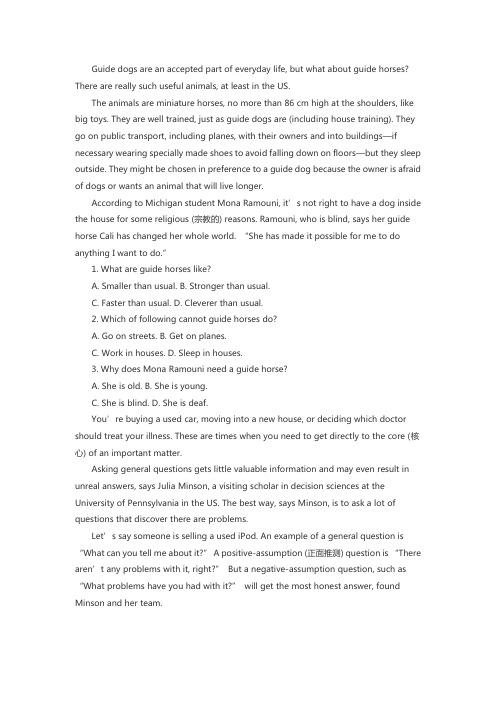
Guide dogs are an accepted part of everyday life, but what about guide horses? There are really such useful animals, at least in the US.The animals are miniature horses, no more than 86 cm high at the shoulders, like big toys. They are well trained, just as guide dogs are (including house training). They go on public transport, including planes, with their owners and into buildings—if necessary wearing specially made shoes to avoid falling down on floors—but they sleep outside. They might be chosen in preference to a guide dog because the owner is afraid of dogs or wants an animal that will live longer.According to Michigan student Mona Ramouni, it’s not right to have a dog inside the house for some religious (宗教的) reasons. Ramouni, who is blind, says her guide horse Cali has changed her whole world. “She has made it possible for me to do anything I want to do.”1. What are guide horses like?A. Smaller than usual.B. Stronger than usual.C. Faster than usual.D. Cleverer than usual.2. Which of following cannot guide horses do?A. Go on streets.B. Get on planes.C. Work in houses.D. Sleep in houses.3. Why does Mona Ramouni need a guide horse?A. She is old.B. She is young.C. She is blind.D. She is deaf.You’re buying a used car, moving into a new house, or deciding which doctor should treat your illness. These are times when you need to get directly to the core (核心) of an important matter.Asking general questions gets little valuable information and may even result in unreal answers, says Julia Minson, a visiting scholar in decision sciences at the University of Pennsylvania in the US. The best way, says Minson, is to ask a lot of questions that discover there are problems.Let’s say someone is selling a used iPod. An example of a general question is “What can you tell me about it?”A positive-assumption (正面推测) question is “There aren’t any problems with it, right?”But a negative-assumption question, such as “What problems have you had with it?”will get the most honest answer, found Minson and her team.In a study, 87% of the sellers warned the buyers to problems when asked a negative-assumption question, while 59% of those did the same thing to apositive-assumption one.When you want the truth, you have to ask for it. What problems does this car have? What are the worst parts of this job? How many people with my kind of illness have been successfully treated? Your questions should communicate that you are sure there will be difficulties and that you want to know about them.4. What can we do if we want the truth, according to the passage?A. Ask for it ourselves.B. Talk with honest people.C. Study it ourselves.D. Do some experiments.5. What kind of questions has the best result?A. General questions.B. Positive-assumption questions.C. Careful questions.D. Negative-assumption questions.6 Which of the following can be the best title for the passage?A. How to Find Honest PeopleB. How to Talk with OthersC. How to Get an Honest AnswerD. How to Avoid Being CheatedResearchers have recently discovered how to make families work more successfully.A surprising idea has appeared: the single most important thing you can do for your family, it seems, is to develop a family story.I first heard this idea in the mid-1990s from Marshall Duke, a professor at Emory University. Duke was studying stories in families when his wife, a children’s learning specialist, made a discovery: “The students who know a lot about their families will do better when they face challenges (挑战),”Sara said.Interested, Duke set out to test her conclusion. He and Emory workmate Robyn Fivush developed a method called the “Do You Know?”degree that asked children to answer 20 questions such as: Do you know where your grandparents grew up? Do you know where your mum and dad went to high school? Do you know about an illness or something really terrible that happened in your family?Duke and Fivush asked those questions to members of four dozen families in 2001. They then compared the children’s results with a group of psychological (心理学的) tests the children had taken and reached a conclusion that agreed to Sara’s theory. The more children knew about their families’histories, the stronger their sense of control over their lives, the higher their self-respect, and the more successfully they believed their families worked from generation to generation (代代传承).“We were blown away,”Duke said. The researchers mentioned the children after the terrible events of September 11, 2001. “Once again,”Duke said, “the ones who knew more about their families proved to be stronger.”Why does knowing where her grandmother went to school help a child overcome something terrible and difficult? Duke said that children who have the mostself-confidence have what he calls “a strong intergenerational self”. They know that they come from something bigger than themselves.Duke suggested that parents do the same activities with their children again and again. Any kind of activities work to teach the sense of history: holidays, vacations, big family get-togethers, even a drive to the shop. “These traditions become part of your family,”Duke said.Years of research have showed that most happy families also communicate successfully, but it’s not simply a matter of talking through problems. Talking also means telling a positive (正面的) story about yourselves. When faced with a challenge, happy families, like happy people, just add a new chapter (章) to their life story that shows them overcoming the difficulty. This skill is very important for children when they are growing up.The bottom lines: if you want a happier family, create, refine and retell the story of your family’s best moments and your relations’ability to overcome difficulty. That act alone may prove the fact that your family will thrive (兴旺) for many generations to come.7. What does the passage mainly tell us?A. Happy children are usually brought up in happy families.B. Our family is the most important place to teach children.C. There are many things for the young to learn from the old.D. Family history plays an important part when children grow up.8. What can the “Do you know?”degree tell us?A. What relation in one’s family is.B. What story one’s family has had.C. How much one knows his family.D. How much one loves his family.9. The underlined sentence “We were blown away”in the passage may mean “______.”A. We were surprised very muchB. We were deeply movedC. We were punished seriouslyD. We were completely lost10. Which of the following is true, according to the passage?A. The event of September 11, 2001 helped Duke draw his conclusion.B. Duke thinks that a strong intergenerational self is the most important.C. Duke and Sara’s research work led us to an unexpected conclusion.D. According to Duke, positive talks will add new chapters to one’s life.1. A2. D3. C4. A5. D6. C7. D 8. C 9. A 10. B。
小学语文二年级试题:课外阅读考级试卷一、二年级一级
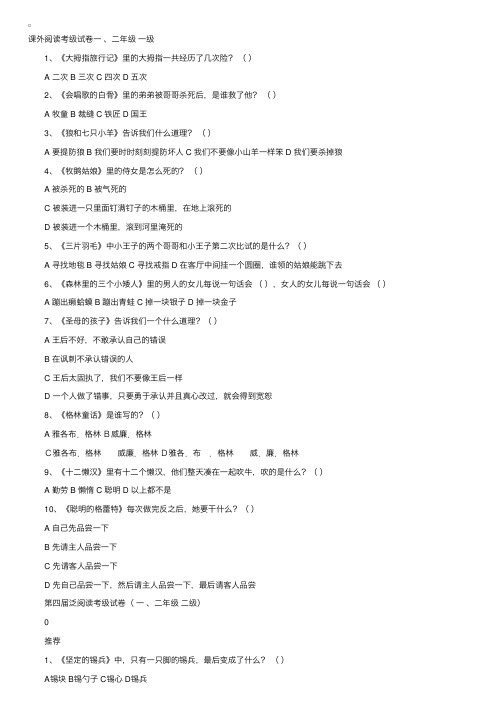
课外阅读考级试卷⼀、⼆年级⼀级 1、《⼤拇指旅⾏记》⾥的⼤拇指⼀共经历了⼏次险?()A ⼆次B 三次C 四次D 五次 2、《会唱歌的⽩⾻》⾥的弟弟被哥哥杀死后,是谁救了他?()A 牧童B 裁缝C 铁匠D 国王 3、《狼和七只⼩⽺》告诉我们什么道理?()A 要提防狼B 我们要时时刻刻提防坏⼈C 我们不要像⼩⼭⽺⼀样笨D 我们要杀掉狼 4、《牧鹅姑娘》⾥的侍⼥是怎么死的?()A 被杀死的B 被⽓死的 C 被装进⼀只⾥⾯钉满钉⼦的⽊桶⾥,在地上滚死的 D 被装进⼀个⽊桶⾥,滚到河⾥淹死的 5、《三⽚⽻⽑》中⼩王⼦的两个哥哥和⼩王⼦第⼆次⽐试的是什么?()A 寻找地毯B 寻找姑娘C 寻找戒指D 在客厅中间挂⼀个圆圈,谁领的姑娘能跳下去 6、《森林⾥的三个⼩矮⼈》⾥的男⼈的⼥⼉每说⼀句话会(),⼥⼈的⼥⼉每说⼀句话会()A 蹦出癞蛤蟆B 蹦出青蛙C 掉⼀块银⼦D 掉⼀块⾦⼦ 7、《圣母的孩⼦》告诉我们⼀个什么道理?() A 王后不好,不敢承认⾃⼰的错误 B 在讽刺不承认错误的⼈ C 王后太固执了,我们不要像王后⼀样 D ⼀个⼈做了错事,只要勇于承认并且真⼼改过,就会得到宽恕 8、《格林童话》是谁写的?() A 雅各布.格林B威廉.格林 C雅各布.格林 威廉.格林D雅各.布 .格林 威.廉.格林 9、《⼗⼆懒汉》⾥有⼗⼆个懒汉,他们整天凑在⼀起吹⽜,吹的是什么?()A 勤劳B 懒惰C 聪明D 以上都不是 10、《聪明的格蕾特》每次做完反之后,她要⼲什么?() A ⾃⼰先品尝⼀下 B 先请主⼈品尝⼀下 C 先请客⼈品尝⼀下 D 先⾃⼰品尝⼀下,然后请主⼈品尝⼀下,最后请客⼈品尝 第四届泛阅读考级试卷(⼀、⼆年级⼆级) 0 推荐 1、《坚定的锡兵》中,只有⼀只脚的锡兵,最后变成了什么?() A锡块 B锡勺⼦ C锡⼼ D锡兵 2、在《丑⼩鸭》中,丹麦的民间传说,鹤鸟是从哪⾥飞来的?() A埃及 B希腊 C罗马 D印度 3、在,《飞箱》中,那个男的对公主说,他是谁?() A⼟⽿其⼈的神 B上帝 C神 D魔法师 4、《海的⼥⼉》中,国王有⼏个美丽的公主?()A 5B 6C 7D 4 5、《丑⼩鸭》中的那个⽼太婆叫那只猫什么?() A“⼉⼦” B“⼩⼉⼦” C“⼥⼉” D“⼩⼥⼉” 6、《海的⼥⼉》⽤什么换来了能变出双腿的药⽔?() A听觉 B眼睛 C美貌 D声⾳ 7、在《皇帝的新装》中,⼈们提到皇帝总是说什么?() A“皇帝在打猎” B“皇帝在看戏” C“皇帝在更⾐室” D“皇帝在买⾐服” 8、《蓟的遭遇》中蓟是哪国的国花?() A苏格兰 B苏联 C俄国 D罗马 9、在《甲⾍》中的甲⾍⾛出马厩后,遇上的第⼀个动物是谁?() A⽑⽑⾍ B蝉 C蝴蝶 D⼩瓢⾍ 10、在《卖⽕柴的⼩⼥孩》中,⼩⼥孩划着的最后⼀根⽕柴,谁出现了?() A⼤铁炉 B烤鹅 C圣诞树 D她的⽼祖母 11、在《⼤克劳斯和⼩克劳斯》中,⼤克劳斯怎么样?() A脾⽓暴躁、性格贪婪 B和蔼、聪明 C机智 D很爱贪⼩便宜 12、⼤克劳斯有⼏匹马?() A3 B4 C5 D6 13、⼩克劳斯的马是被⼤克劳斯的什么打死的?() A ⽊棍 B⽊槌 C⽊棒 D⽊头 14、《拇指姑娘》中,是______救了拇指姑娘。
福建师范大学课程考试《高级英语阅读(一)》作业考核试题

The school's insistence on uniformsor other obligations and, possibly, itsundisguised disapproval of an "inadequate"family, may be the last straw. Children whogrow up in such families are likely to bedeprived in many ways besides education.
Enforced school absence in childhoodis sometimes used by adults to justifytheir own career failure. It is difficult for achild to play truant regularly if his parentsare keen for him to attend school. Muchtruancy is openly condoned; as for therest, not knowing that your children playtruant is equivalent to not ensuring thatthey are at school. It shows lack of interestin their whereabouts, apathy about theireducation, or inability to control them — .,ineffective parents...
【试卷一】Python一级考试练习题精品程序填空阅读填空程序试题
【试卷一】Python一级考试练习题精品程序填空阅读填空程序试题一、程序填空1.程序设计:唐三藏又被妖怪抓走了,这次孙悟空还是没打得过妖怪,于是来求观音菩萨。
观音菩萨告诉孙悟空,在天庭里身高正好为1000米的那位神仙可以降伏此妖。
于是悟空立刻来到天上,在玉皇大帝的神仙册上看到了按身高从矮到高排列有10000个神仙。
由于时间紧迫,悟空想用最短的时间找到这位神仙,这样才可以尽快解救唐僧。
代码如下:List=list(map(int,input(“请按身高递增顺序依次输入10000个神仙的身高”).sp lit()))left=1right=10000while ①mid=②if List[mid]==1000:③elif List[mid]<1000:④else:⑤print(“能帮孙悟空的神仙在第{0}位上”.format(mid+l))(1)程序代码中①处正确的代码是(_______)。
A.left<right B.left<=right C.left!=right D.left>right(2)程序代码中②处正确的代码是(_______)。
A.(left+right)/2 B.(left+right)\2C.(left+right)//2 D.(left+right)\\2(3)程序代码中③处正确的代码是(_______)。
A.pass B.print(mid)z C.break D.continue(4)程序代码中④处正确的代码是(_______)。
-A.left=mid B.right=mid C.left=mid+1 D.right=mid-1(5)程序代码中⑤处正确的代码是(_______)。
A.left=mid B.right=mid C.left=mid+1 D.right=mid-12.将下列程序代码补充完整:某同学参加了学校体检,体检的医生告诉他体重超重,需要加强运动。
该同学了解到运动时,心率如能控制在一定范围内,对增强心血管系统和呼吸系统的功能都有很好的效果;超出范围,对身体反而会有损伤。
全国英语等级考试1级考试内容介绍
全国英语等级考试1级考试内容介绍全国英语等级考试(Public English Test System,简称PETS)是教育部主办,面向全国的英语水平测试。
它旨在测试考生在公共场合使用英语进行交流的能力,包括听力、阅读、写作和口语。
该考试分为多个级别,其中一级(PETS-1)是最基本的级别。
一、考试内容1、听力部分:PETS-1的听力部分包括短对话、长对话和短文理解。
短对话通常包含两个或三个简短的对话,要求考生根据听到的内容选择正确的答案。
长对话包含两个较长的对话,要求考生对对话内容进行理解并回答相关问题。
短文理解包含一篇短文,考生需要理解文章的主旨并回答相关问题。
2、阅读部分:PETS-1的阅读部分包括短文阅读和补全信息。
短文阅读通常包含两篇或三篇短文,要求考生根据文章内容回答问题。
补全信息是一篇较长的文章,其中某些单词或短语被留空,要求考生根据文章内容填空。
3、写作部分:PETS-1的写作部分包括短文写作和便条写作。
短文写作要求考生写一篇短文,主题通常与日常生活相关。
便条写作要求考生写一张便条,内容通常是关于安排计划或传达信息。
4、口语部分:PETS-1的口语部分包括自我介绍和话题讨论。
自我介绍要求考生在考试开始时向考官介绍自己。
话题讨论要求考生就某个话题发表看法,并与考官进行讨论。
二、考试难度PETS-1是面向英语初学者的考试,因此难度相对较低。
听力部分和阅读部分的题目相对简单,主要测试考生对基础词汇和语法的掌握情况。
写作部分和口语部分的题目也相对容易,主要测试考生的基本表达能力和语言组织能力。
三、总结全国英语等级考试1级(PETS-1)是面向英语初学者的考试,主要测试考生在公共场合使用英语进行交流的能力。
该考试的听力、阅读、写作和口语部分都围绕这个主题展开。
虽然难度相对较低,但对于初学者来说,掌握基础词汇、语法和表达方式仍然是很重要的。
通过该考试,考生可以了解自己在公共场合使用英语进行交流的能力,从而为进一步提高自己的英语水平提供参考。
2021年7月日语能力考一级N1阅读真题点评
2021年7月日语能力考一级N1阅读真题点评本次的能力考落下了帷幕。
下面日语教研就本次能力考试n1级别阅读试题进行一下点评,希望能借助此次点评为同学们今后的备考指明方向。
此次的n1阅读从整体的难易度来说较去年12月份稍低。
虽然文章的选材主要是理性的“H文本”,但抽象程度高的文章并不多。
长文章也更受欢迎,不难理解。
相反,短文更抽象,尤其是短文的第一个长句,但关键词和句子在解决问题方面更明显。
下面结合此次真题来和大家分享下做n1读解时的一些注意点。
一、把握文章框架及写作思路许多候选人对更多关于哲学、经济和生活的抽象文章感到“痛苦”。
首先,这类文章的内容对考生来说比较陌生。
第二,文章无法理解,因为大量的长句分析不清楚。
在这种情况下,理清文章的总体框架和作者的写作思路将有助于解决问题。
让我们以问题8的第一个短篇故事为例。
这篇文章主要阐述的是恋爱关系。
文中出现了大量长句以及类似「全人格」、「自己のある一面をせ合う」、「振幅」等比较抽象的表达。
但如果搞清了写作思路,解题就非常容易。
首先作者提到恋爱是一种特别的关系,关键部分是「全人格と全人格とのぶつかりあい」。
接着通过「それとも」这个接续词提出了关于恋爱的第二种观点,即「自己のある一面をせ合う」。
那作者是倾向于哪一种观点呢?后面就是关键了,我们要寻找作者的观点。
最后一句出现了表示转折的接续词「だが」,说趋势是偏向于后者,指的也就是「自己のある一面をせ合う」。
题目问的是“作者认为现代的恋爱是如何的”,和「自己のある一面をせ合う」一致的就是选项4。
通过对这个问题的分析,我们可以看到,最简单、最有效的方法就是掌握文章的框架和写作思路就是寻找接续词。
通过接续词,可以搞清楚句与句、段与段之前的关系。
特别是遇到表示转折、概括的接续词时一定要注意。
对于接续词掌握得还不好的考生可以结合开心词场的免费词书《能力考必背接续词》来进行复习巩固。
二、文章出处暗含玄机这篇文章的来源不是无用的信息。
日语等级考试一级阅读练习试题
日语等级考试一级阅读练习试题
つい先日のことだが、アメリカのあるスポーツ指導者が日本の競技者についていっていた言葉を新聞で見て興味をひかれた。
日本人はスポーツの上に自分の人生を築いている。
出発点に人間がいない。
それではダメだというのである。
これは、ほとんどそのままわれわれの音楽にもあてはまる。
何故音楽をやるのかということを問う前に音楽から出発する。
だから、学生のうちは、あるいはコンクールまでは良いが、その先にはつながらない。
これだけの音楽の水準を確保しながら、本当の大家が生まれない。
(遠山一行「音楽の出発点に『人間』はいるか」1991年3月19日付毎日新聞夕刊による)
問い・この文章で、筆者は何を言いたいのか。
1.音楽をする人も、スポーツをする必要がある。
2.なぜ音楽をやるのかをはじめに考えるべきだ。
3.音楽をスポーツのように考えてはいけない。
4.まず演:奏の技術を高めなければならない。
全文翻译:
就在前几天,在报纸上看到一美国体育教练就日本运动员发表的谈话,引起了我的兴趣。
他说日本人是在运动上构造自己的人生。
出发点里没有人,那是不行的。
这也完全可以套用在我们的音乐上。
在没有弄清楚自己为什么要
从事音乐时就向音乐迈出了脚步。
所以在学生当中,或许参加比赛还可以,却再也前进不了。
他们只能保持那种音乐水平却成不了真正的名家。
答案:2。
- 1、下载文档前请自行甄别文档内容的完整性,平台不提供额外的编辑、内容补充、找答案等附加服务。
- 2、"仅部分预览"的文档,不可在线预览部分如存在完整性等问题,可反馈申请退款(可完整预览的文档不适用该条件!)。
- 3、如文档侵犯您的权益,请联系客服反馈,我们会尽快为您处理(人工客服工作时间:9:00-18:30)。
2010学年瓯海区实验小学阅读素养等级考核一级笔试题
1.《我爸爸》中的我爸爸很爱我,我也很爱爸爸。
()
2.《猜猜我有多爱》中是两只小猴子在比谁爱谁更多。
()
3.《不要再笑了,裘裘》中负鼠妈妈教裘裘学装死本领。
()
4. 狐狸掌柜有一个很厉害的保险柜。
()
5. 小猪唏哩呼噜没和小蛇花花成为好朋友。
()
6.《爷爷一定有办法》中的爷爷是个很小气的人。
()
7. 最后约瑟的纽扣还在他自己那儿。
()
8.《方格子老虎》中小老虎身上的花纹是虎爸和虎妈画上去的横条纹。
()
9.《我有友情要出租》中,小丁子都要给大个儿吃香蕉,大个儿才跟他玩。
()
10.《小猪唏哩呼噜》中的小猪唏哩呼噜名字的由来是因为睡觉时“唏哩呼噜”一片响。
()第二关:选择题(选择正确的答案,把序号填在括号里)(30分)
1.“小荷才来尖尖角,早有蜻蜓立上头”写的是哪一个季节的景色?()
①春天②夏天③秋天④冬天
2.下面哪一首诗告诉我们要珍惜粮食?()
①《静夜思》②《春晓》③《悯农》④《小池》
3.下面哪句诗歌是描写月亮的?()
①《江南》②《绝句》③《古朗月行》④《村居》
4.唐代大诗人孟浩然写过什么诗?()
①《春晓》②《咏鹅》③《江上渔者》④《蜂》
5.《爷爷一定有办法》中约瑟的纽扣被()捡去了。
①小蚂蚁②小老鼠③小蚂蚱
6.绘本《猜猜我有多爱你》中小兔子说自己对妈妈的爱最远可以到达哪里()
①手臂②脚指头③小河④月亮
7.绘本《我有友情要出租》中的大个子猩猩出租友情,它打算每小时收多少钱?
①5元②10元③15元④20元
8.下面哪一件事不是《小猪唏哩呼噜》里的小猪干的?()
①巧妙地逃脱了大狼的手心②战胜了要吃掉小狼的月牙熊
③为鸭太太做保镖④整天想着怎样吃掉大象
9.《月亮,生日快乐》中,小熊送给月亮的生日礼物是()。
①围巾②帽子③手套④衣服
10.《猜猜我有多爱你》中小兔子为什么要把手张开?()
①要大兔子抱②要上床睡觉③要告诉大兔子有多爱她
第三关:连线题(20分)
1.把诗句和诗人连一连。
(12分)
①儿童散学归来早,忙趁东风放纸鸢。
范仲淹
②君看一叶舟,出没风波里。
高鼎
③又疑瑶台镜,飞在青云端。
杜甫
④迟日江山丽,春风花草香。
李白
⑤小荷才露尖尖角,早有蜻蜓立上头。
王安石
⑥遥知不是雪,为有暗香来。
杨万里
2.把同一首古诗的诗句连一连。
(8分)
相看两不厌云深不知处
只在此山中只有敬亭山
牧童骑黄牛沙暖睡鸳鸯
泥融飞燕子歌声振林樾
第四关:阅读题(10分)
有一天,妈妈对他说:“约瑟,看看你的毯子,又破又旧,好难看,真该把它丢了。
”
约瑟说:“爷爷一定有办法。
”
爷爷拿起了毯子,翻过来,又翻过去。
“嗯……”爷爷拿起剪刀开始喀吱、喀吱地剪,再用针飞快地缝进、缝出、缝进、缝出。
爷爷说:“这块料子还够做……”
……一件奇妙的外套。
约瑟穿上这件奇妙的外套,开心地跑出去玩了。
不过,约瑟渐长大了,奇妙的外套也变得老旧了。
1.以上文字来自哪本书?写下书名:
2.爷爷先把毯子做成一件外套,后来还做成什
么?对的打“√”。
衬衫()背心()领带()围巾()
手帕()
3.上面三个加粗的字,你认识几个?()个
4.爷爷是怎么做奇妙外套的?用“”划出一个句子。
5.请写出你最喜欢读的绘本名字《》。
第五关:附加题(10分)
1. 把动物填进括号,组成成语。
(6分)
羊猪兔龙蛇虎牛马鼠猴狗鸡
走()观花对()弹琴
画()点睛打草惊()
亡()补牢守株待()
2.读读谜语,把谜底写在括号里。
(4分)
(1)一点一点大(猜一个字)()
(2)望去绿油油,内有屋青青,敲开花墙门,个个穿红裙。
(猜一种水果)()。
